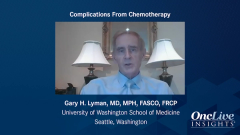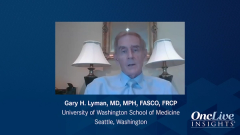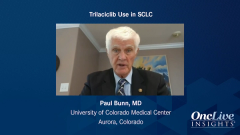
Chemotherapy-Induced Myelosuppression & COVID-19
Episodes in this series

Paul Bunn, MD: The coronavirus pandemic has affected patients. Patients with lung cancer and other cancers are even more susceptible to infection by COVID-19 [coronavirus disease 2019], and their outcomes are worse. We try to keep cancer patients away from COVID-19 as much as possible. We’ve been trying to limit the exposure using telehealth visits and other methods. We have been getting blood counts frequently by home blood draws for our patients and trying to keep them out of the hospital as much as possible. The pandemic has also created some problems with blood supply and blood transfusions. Because of that, there have been some attempts to lower the threshold for treatments of anemia, for example, to preserve the red blood cell supply. Ordinarily, we transfuse people who have a hemoglobin count less than 8 g/dL, but there have been some guidelines to say that we should change that to 7 g/dL. With thrombocytopenia, there have been some recommendations to transfuse people with a platelet count of less than 10 g/dL instead of a platelet count of less than 20 g/dL.
Any treatment that would make it less common to have anemia or thrombocytopenia is particularly important during the pandemic. That is so transfusions of red blood cells and platelets are needed less often, and also so patients have febrile neutropenia and have to visit the hospital less often.
Gary H. Lyman, MD, MPH, FASCO, FRCP: Obviously, the lives of our patients and our lives as health care providers have been profoundly impacted by the coronavirus pandemic. It has become a global pandemic and has had a profound impact on all of us. Globally, we now have more than 22 million patients infected with COVID-19, and there have been over 750,000 deaths as a result of this. In the United States, which unfortunately has the highest number of COVID-19 infections—around 5.6 million—there have been over 170,000 deaths from COVID-19.
We’ve warned, from the early data coming out of China and then Italy, that cancer patients are among the most vulnerable to COVID-19. Particularly, we’ve warned of the serious and sometimes often fatal complications of COVID-19 on top of their cancer.
We formed a consortium 3 or 4 months ago called the COVID-19 and Cancer Consortium. We’re gathering data throughout the United States, and now globally, on cancer patients infected by COVID-19. Our results were published in The Lancet 2 months ago. They looked at the various risk factors for serious complications and the impact of cancer treatment in the first 1000 cancer patients with documented COVID-19.
A few weeks ago, we updated the data with more than 2200 patients with cancer and COVID-19 in a virtual meeting of the American Association for Cancer Research. This was published in Cancer Discovery. All these data have led us to better understand the risk factors for getting COVID-19 and serious adverse outcomes in patients with cancer.
The guidelines for the use of supportive care for cancer patients have been appropriately modified, at least on an interim basis. The National Comprehensive Cancer Network, or NCCN, has issued interim recommendations for enhanced use of hematopoietic growth factors. Those include the supportive care that we have used routinely, but only for higher-risk patients. The recommendations broaden indications for the use of myeloid growth factors in patients who are at 20% or greater risk. Now they are recommended for patients whose risk is 10% or greater, and even in patients at lower risk if they have serious comorbidities.
The threshold for the use of these agents has been decreased. There is also a recommendation for using them, if they were not used prophylactically, in patients who develop febrile neutropenia to speed up the recovery of the myeloid precursors. The use of self-administration, which is not generally utilized, or on-body injectors, have become more routine.
There are cautions, because there has been evidence of cytokine release in some patients receiving myeloid growth factors. Since acute respiratory distress syndrome can be a complication of COVID-19, some caution needs to be used there. Even for anemia, the recommendations are now saying not to transfuse patients until their hemoglobin drops below 7 g/dL or platelets drop below 10,000 per mm3. Again, they are broadening the indications for use of the supportive care in that setting.
In the end, 1 of the impacts on patients is that some patients’ treatments have been delayed. Their treatments have been modified. The monitoring of their disease or screening for recurrence of their cancer have been delayed because of the pandemic. We all have to be aware of potential secondary effects of the pandemic on the management of other conditions that would normally bring patients to the doctor to be evaluated. Patients may be avoiding the health care system to minimize the risk of infection. But these will all have potential downstream ramifications with more advanced disease, or for response to our treatments in the long term.
Transcript Edited for Clarity















































